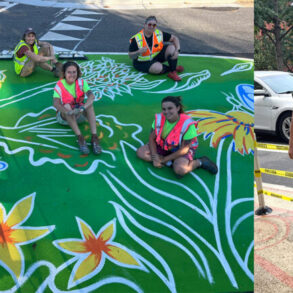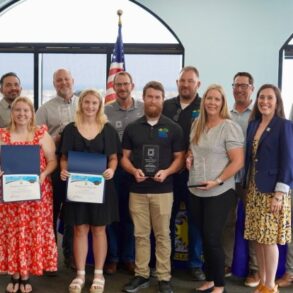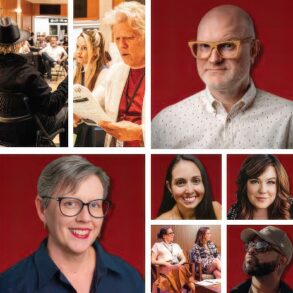
LIFE-CHANGING FELLOWSHIPS
In addition to her role at YoungArts, Arison has also served since 2013 as president of the Arison Arts Foundation, through which she has provided financial support to emerging artists across the globe, including at Emory.
For the past four years, Arison has provided funding to the Emory Arts Fellows program, which seeks to cultivate artistic talent in a setting that allows fellows, faculty members and students to reimagine the influence art can have on the world around them. This year, the Arison Arts Foundation’s initial support for two fellowships annually was expanded to three.
Arison says working with Emory on the program is fulfilling because it’s not typical for universities to understand the importance of arts fellowships and residencies. “I was thinking a lot about how to support artists at critical junctures in their lives,” Arison says. “The concept of a residency is hugely important for artists and can be life-changing. To be able to do that with Emory is very exciting.”
PROUD PATRON Arison poses with $wagfuture 2812, a work created by David Correa and Alberto Checa, two artists she helped support through YoungArts.
PROUD PATRON Arison poses with $wagfuture 2812, a work created by David Correa and Alberto Checa, two artists she helped support through YoungArts.
A fellowship offers artists time, space and resources to develop their artistry and build their portfolios. According to Kevin Karnes, divisional dean of arts in Emory College of Arts and Sciences, the benefits go both ways. He says undergraduate creatives welcome getting face time with and mentorship from early-career artists whose experiences in contemporary art marketplaces aren’t far from their own.
Along with helping artists develop, the program is also a gateway for them to enter the academy. Karnes notes that four of the six Emory Arts Fellows have gone on to careers in college and university teaching.
That the fellowship program catalyzes career development alongside artistic development is no accident. The program was designed to help them support their art careers as well as develop their body of creative work. The fellows have access to mentorship from the Goizueta Business School, where they can develop skills to advance their business acumen.
ART TOUCHES EVERYTHING
“I love that Emory is thinking about trying to break through the silos of ‘business over here, art over there,’” Arison says.
She rejects the widespread belief that art and artists operate in a world distinct from business or commerce. Art shouldn’t be confined to rarefied spaces, or what she dubs “ivory towers” of museums, galleries and Broadway.
“Go buy a poster you like, buy something that makes you feel something and you want to see on your wall. Something that you want to live with.”
Everyday business, Arison says, is driven by artists and their art. “Look at the world around you. Everything has been touched by an artist,” she says. “The car you drive had designers. The clothes you wear, that’s a fashion designer. The shows you’re watching, those are actors, screenwriters, cinematographers, costume designers, set designers. Art affects everything in our world. I think that once you understand that, you understand the importance of supporting artists.”
She hopes that people and institutions interested in supporting the arts will think about individual artists and not just galleries and museums. She draws from her art history education to point out that the Italian Renaissance relied on the Medici family’s support for a culture of mentorship and apprenticeship among individual artists.
“That’s something that’s been lost,” Arison says.
Her advice to people who want to support artists and art but don’t know where to begin: See as much as you can. “Take advantage of all the opportunities you have to see art,” Arison says. “The better your eye gets, the better your understanding will be. And when you go out, you’ll meet interesting, exciting people.”
Her other advice: Ignore art trends. “Go buy a poster you like,” she says. “Buy something that makes you feel something and you want to see on your wall. Something that you want to live with.”
Photography by Nick Garcia and Courtesy of Sarah Arison.
This post was originally published on this site be sure to check out more of their content








